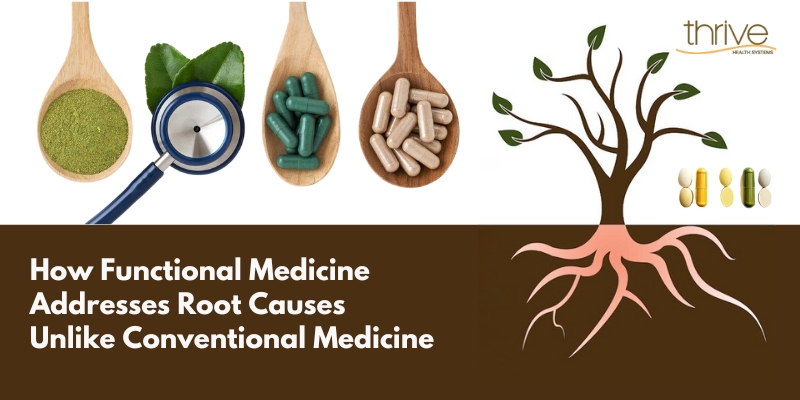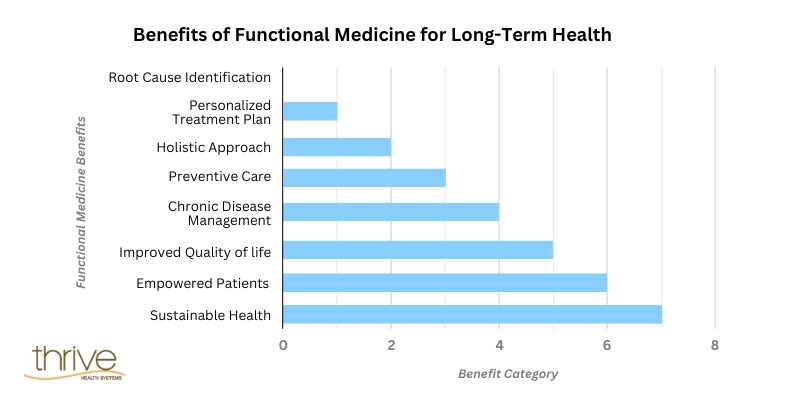
As more people seek healthcare that goes beyond simply masking symptoms, Functional Medicine has emerged as a compelling alternative to conventional approaches. Rooted in the philosophy of a root cause approach, Functional Medicine focuses on identifying and addressing the true origins of health issues. Rather than applying a one-size-fits-all treatment, it views each patient as unique, considering factors like genetics, lifestyle, and environment to create a personalized path to wellness. This difference in functional vs. conventional medicine is profound, offering a pathway that aims for true healing and balance rather than temporary symptom relief.
Functional Medicine is particularly transformative in chronic disease management, where it emphasizes holistic health solutions and integrative health practices. This approach doesn’t just manage chronic issues—it seeks to resolve them by restoring the body’s natural balance. With a focus on treating underlying causes, Functional Medicine practitioners empower individuals to cultivate lasting health improvements, promoting a more vibrant, resilient life.
How Functional Medicine Addresses Root Causes Unlike Conventional Medicine
Functional Medicine offers a transformative way to approach health by focusing on a root cause approach to healing. Unlike conventional practices, it is tailored to addressing root causes in health, integrating holistic, long-term strategies aimed at full-body wellness. Here are ten fundamental aspects of Functional Medicine, each demonstrating how this functional vs. conventional medicine approach provides a unique path to health.
Note: Functional Medicine emphasizes a root cause approach to health, seeking to understand and treat the underlying causes of illnesses rather than just managing symptoms. Unlike conventional medicine, which often relies on standardized treatments like medications and surgery to address symptoms, Functional Medicine takes a holistic approach, examining factors such as genetics, lifestyle, environment, and diet to create personalized treatment plans. This approach not only targets symptoms but also aims for long-term health improvement by addressing chronic disease and promoting balance within the body.
1. Root Cause Approach to Health
- Addressing underlying issues: Functional Medicine seeks to uncover and resolve the underlying contributors to illness, rather than just managing symptoms.
- System-focused analysis: Practitioners analyze how body systems interact and how imbalances contribute to health issues.
- Long-lasting results: This root cause approach often leads to more sustainable, lasting improvements in health.
2. Holistic Health Solutions
- Mind-body connection: Functional Medicine embraces holistic health solutions, recognizing the connection between mental, emotional, and physical health.
- Nutrition and lifestyle focus: Treatment plans emphasize nutrition, exercise, sleep, and stress management as essential to well-being.
- Comprehensive care: By supporting the whole body, Functional Medicine creates a more balanced, resilient foundation for health.
3. Personalized Medicine Approach
- Customized treatments: Unlike conventional care, Functional Medicine practitioners provide a personalized medicine approach that’s uniquely tailored to each individual’s needs.
- Genetic considerations: Personal genetics and family history play a crucial role in crafting treatment plans.
- Empowered patients: Patients are actively involved in their healing process, making informed choices that align with their health goals.
4. Functional Medicine vs. Conventional Medicine
- Symptom vs. root focus: Functional vs. Conventional Medicine reflects a fundamental difference; while conventional care often addresses symptoms, Functional Medicine seeks the source.
- Proactive, preventive care: Functional Medicine emphasizes prevention and proactive care, aiming to stop illness before it starts.
- Interconnected systems: This approach views body systems as interconnected, whereas conventional methods may focus on isolated symptoms.
5. Benefits for Chronic Disease Management
- Comprehensive support: Functional Medicine is highly effective for chronic disease management, offering a broader view of issues like diabetes, autoimmune disorders, and metabolic syndromes.
- Targeted intervention: By focusing on treating underlying causes, this approach can reduce or eliminate the root contributors to chronic conditions.
- Patient empowerment: Patients receive tools and education to actively manage and improve their conditions for the long term.
6. Integrative Health Practices
- Blending therapies: Functional Medicine integrates conventional and alternative treatments, creating integrative health practices for optimal results.
- Natural and medical balance: Treatments often include herbal medicine, nutrition, and supplements alongside conventional care.
- Complementary approaches: Acupuncture, physical therapy, and lifestyle counseling are also incorporated to create a comprehensive treatment plan.
7. Functional Medicine Benefits for Long-Term Health
- Lasting wellness: Focusing on Functional Medicine for long-term health helps individuals achieve and maintain wellness beyond acute issues.
- Reduced dependency: Patients may experience less reliance on medications as underlying issues are resolved.
- Increased vitality: Patients often report improved energy, mood, and resilience, feeling empowered to sustain their health.
Functional Medicine Benefits for Long-Term Health
| Benefit | Description |
|---|---|
| Root Cause Identification | Addresses the underlying causes of illness rather than just treating symptoms. |
| Personalized Treatment Plans | Tailors treatment plans to individual needs, considering genetics, lifestyle, and environment. |
| Holistic Approach | Considers the whole person, including physical, mental, and emotional health. |
| Preventive Care | Focuses on preventing disease through lifestyle modifications and early intervention. |
| Chronic Disease Management | Offers effective strategies for managing chronic conditions like diabetes, heart disease, and autoimmune disorders. |
| Improved Quality of Life | Promotes overall well-being and reduces reliance on medications. |
| Empowered Patients | Encourages patient involvement in their healthcare decisions and empowers them to take control of their health. |
| Sustainable Health | Aims for long-term health improvements rather than quick fixes. |

8. Treating Underlying Causes
- Beyond symptoms: Unlike traditional approaches that may only reduce symptoms, Functional Medicine benefits patients by treating underlying causes.
- Comprehensive testing: Extensive tests, including bloodwork and hormone panels, identify root issues related to nutrient deficiencies, inflammation, or hormonal imbalance.
- Systemic healing: By identifying these root contributors, Functional Medicine helps patients experience comprehensive healing.
9. Supporting Mental Health and Emotional Well-being
- Emphasis on mental health: The holistic health solutions of Functional Medicine recognize mental health as central to overall wellness.
- Stress management: Functional Medicine practitioners often incorporate techniques for reducing stress, which benefits both physical and mental health.
- Integrated care: By linking mental health with physical care, Functional Medicine creates a balanced approach that considers the impact of emotions on the body.
10. Functional Medicine as Preventative Health Care
- Proactive care model: Functional Medicine provides a proactive care model that emphasizes preventing illness before it occurs.
- Lifestyle interventions: Practitioners recommend specific lifestyle changes to boost resilience, making prevention a key aspect of Functional Medicine for long-term health.
- Regular evaluations: Functional Medicine promotes regular check-ups and assessments to address potential issues early, supporting ongoing vitality.
Conclusion
Through its root cause approach, Functional Medicine offers a unique and holistic alternative to conventional healthcare. Emphasizing chronic disease management and the personalized medicine approach, Functional Medicine addresses the full complexity of individual health. By focusing on treating underlying causes rather than masking symptoms, this approach provides sustainable and profound Functional Medicine benefits, empowering individuals toward vibrant, long-lasting health.
From Surviving to Thriving: Functional Medicine for a Healthier Tomorrow
Don’t let your chronic illness hinder your social and family life. Discover the magical power of functional medicine in Colorado Springs for long-term relief. At Thrive Health System, our team of functional medicine MDs offers customized assessment and treatment plans based on your needs.
So, schedule a consultation with one of our experienced functional medicine practitioners today and see the difference!

